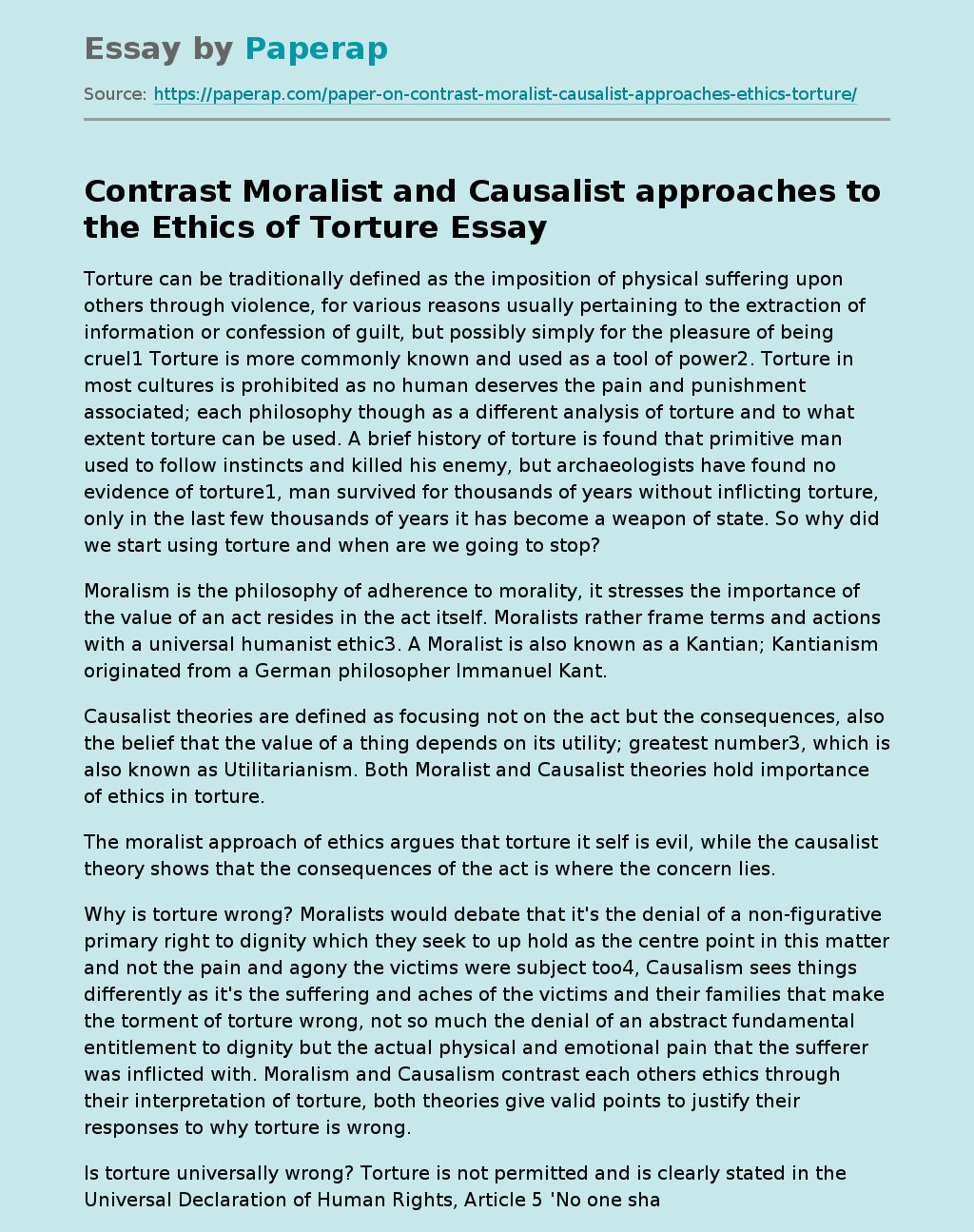Contrast Moralist and Causalist approaches to the Ethics of Torture
Torture can be traditionally defined as the imposition of physical suffering upon others through violence, for various reasons usually pertaining to the extraction of information or confession of guilt, but possibly simply for the pleasure of being cruel1 Torture is more commonly known and used as a tool of power2. Torture in most cultures is prohibited as no human deserves the pain and punishment associated; each philosophy though as a different analysis of torture and to what extent torture can be used.
A brief history of torture is found that primitive man used to follow instincts and killed his enemy, but archaeologists have found no evidence of torture1, man survived for thousands of years without inflicting torture, only in the last few thousands of years it has become a weapon of state. So why did we start using torture and when are we going to stop?
Moralism is the philosophy of adherence to morality, it stresses the importance of the value of an act resides in the act itself.
Moralists rather frame terms and actions with a universal humanist ethic3. A Moralist is also known as a Kantian; Kantianism originated from a German philosopher Immanuel Kant.
Causalist theories are defined as focusing not on the act but the consequences, also the belief that the value of a thing depends on its utility; greatest number, which is also known as Utilitarianism. Both Moralist and Causalist theories hold importance of ethics in torture. The moralist approach of ethics argues that torture it self is evil, while the causalist theory shows that the consequences of the act is where the concern lies.
Why is torture wrong? Moralists would debate that it’s the denial of a non-figurative primary right to dignity which they seek to up hold as the centre point in this matter and not the pain and agony the victims were subject too4, Causalism sees things differently as it’s the suffering and aches of the victims and their families that make the torment of torture wrong, not so much the denial of an abstract fundamental entitlement to dignity but the actual physical and emotional pain that the sufferer was inflicted with. Moralism and Causalism contrast each others ethics through their interpretation of torture, both theories give valid points to justify their responses to why torture is wrong.
Is torture universally wrong? Torture is not permitted and is clearly stated in the Universal Declaration of Human Rights, Article 5 ‘No one shall be subjected to torture or cruel, inhuman or degrading treatment and punishment’. This clearly displays that torture is unsuitable for anyone anywhere and still to this day it is happening in so many places. From a moralist view torture is always prohibited regardless the reason, as in true Kantian style ends must never justify means4.
Therefore torture or harsh punishment is proscribed as a moralist, in comparison Causalism proposes that it is POSSIBLE for situations in which torture as a last resort may be inflicted and a necessity to serve justice or for informational reasons. Both Moralist and Causalist theories display sound evidence to the ethical question of torture being universally wrong.
The last question relates to the nature and temperament of the torturer. A causalist may say that the torturer is a malevolent person but may also add that a person’s character is distinct and responsible as much by omission (observer in charge) as by the torturer or actor. An omission to perform an act, even one as evil as torture, might be as wrong as committing the act itself if the consequences of a failure to carry out the torture result in greater harm to others5, however a rudimentary moralist would dismiss that the torturer would have to be intrinsically evil to commit some horrific and devastating acts. Therefore these two responses to the question are both correct in that both theories hold valid evidence to support their ethics.
Moralistic and Causalistic views on the ethics of torture are slightly similar but different however they both hold importance in the ethical issue of torture. The Causalist shows us that there are circumstances where torture as a last resort maybe used but overall they are completely against these immoral acts of punishment. A Moralistic view determines that under NO circumstances can torture be administered onto another human being, it is inhuman and isn’t even considered an option. Now understanding more about the Moralistic and Causalist theories, can the use of torture ever be justified?
Contrast Moralist and Causalist approaches to the Ethics of Torture. (2017, Dec 04). Retrieved from https://paperap.com/paper-on-contrast-moralist-causalist-approaches-ethics-torture/

